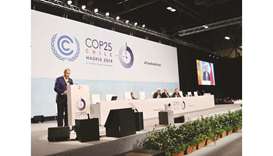Gas Exporting Countries Forum (GECF) secretary-general Dr Yury Sentyurin spoke at the UN Climate Change Conference (COP25) that concluded in Madrid recently.
Addressing the participants, the GECF official reaffirmed the crucial importance of challenges posed by climate change, alongside with the shared values and joint efforts undertaken by the international community to deal with the environmental issues.
Speaking on behalf of the organisation’s member countries – 19 major natural gas producers, Sentyurin emphasised that the natural gas industry looks seriously to technology options that can further promote decarbonisation potential of natural gas, including carbon capture, utilisation and sequestration options, and production of hydrogen from natural gas.
This adds to other progress in efficiency and digitalisation that enables a substantial reduction of greenhouse gases emissions along the entire supply chain.
Furthermore, the current expansion and technology progress of natural gas vehicles (NGVs) across the world offers a valuable opportunity to reduce emissions in the transportation sector.
GECF’s strong belief in the role of constructive international co-operation as a driver for effective global responses to climate change and sustainable development was specifically highlighted by the speaker.
Meanwhile, the professional community’s main concern is that in the era of energy transitions, introduction of discriminatory regulation against cleaner hydrocarbon fuels such as natural gas, disturbs overall gas markets design, undermines investment in critical gas transport infrastructure and new gas supply projects. Natural gas is a balanced solution that contributes substantially to reducing carbon intensity and pollution resulting from energy-related activities, supports access to modern energy, improves availability of supply, and provides affordable energy.
The “blue fuel” can also be a vector of increased co-operation and technology transfer between energy stakeholders. These credentials have been explicitly recognised in the G20 Ministerial Meeting on Energy Transitions and Global Environment for Sustainable Growth in Japan early this year.
The GECF engagement in the UNFCCC as an observer organisation marks the willingness to contribute to scale up the Member Countries’ collective actions in order to reduce the environmental footprint of natural gas.
In this context, the GECF has initiated the Environmental Actions Framework that aims to create a supportive platform allowing Member Countries to share best practices dealing with the environmental challenges, building capabilities and establishing progressive research collaborations on various environment-related topics. This commitment is largely anchored in the GECF Heads of State Declarations including the recent one adopted in Malabo, Equatorial Guinea and the Organisation’s Long-Term Strategy.
In line with this environmental ambition, the GECF has reinforced its co-operation with various organisations to strengthen its research activity, exchange expertise and develop studies related to the interactions between energy and our environment.
Study outcomes are to be translated into concrete recommendations on energy policy actions for the GECF Member Countries.
At the same time, the recently established GECF Gas Research Institute is set to become a pivotal project for the organisation with the aim to develop technical knowledge and innovative technologies that reduce GHGs emissions.
GECF highlights challenges posed by climate change at COP25

Related tags :


